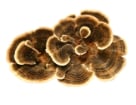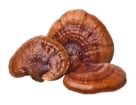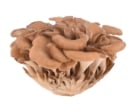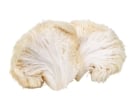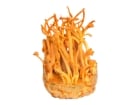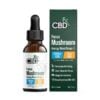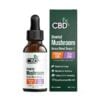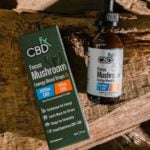
Medically reviewed by
Dr. John Rackham
Written by Clay Steakley
Updated on February 24th, 2022
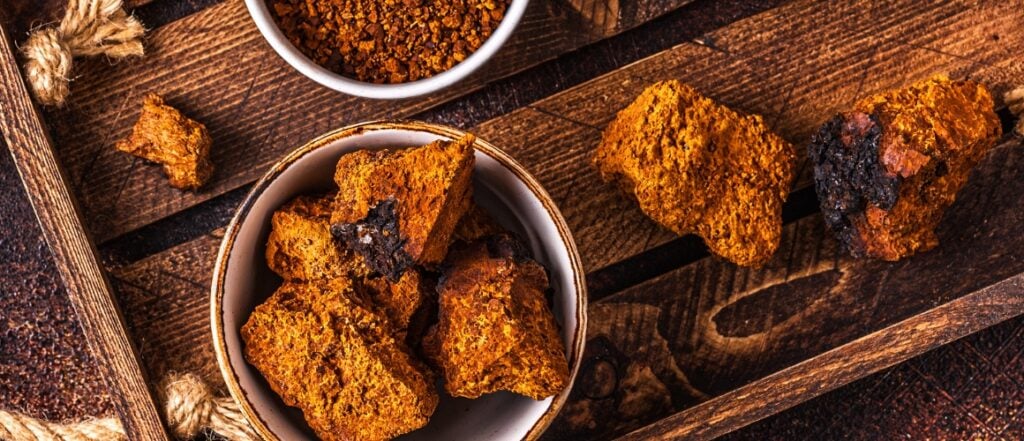
For a humble mushroom found on the birch tree, chaga has had a pretty amazing journey, from medicinal teas across the northern hemisphere to great Russian literature to today’s tea and coffee supplements. What is it about this really pretty unattractive mushroom that demands so much attention?
Known for centuries as a powerful medicine for both body and mind, chaga mushrooms have commanded respect from Canada to Siberia to Korea. Today, we know that part of the reason behind this renown are the natural adaptogenic and nootropic properties of the chaga mushroom, as well as anti-inflammatory properties.
So, what is chaga, and how can the mushroom inonotus obliquus help us with stress, wellness, and more? Let’s take a look.
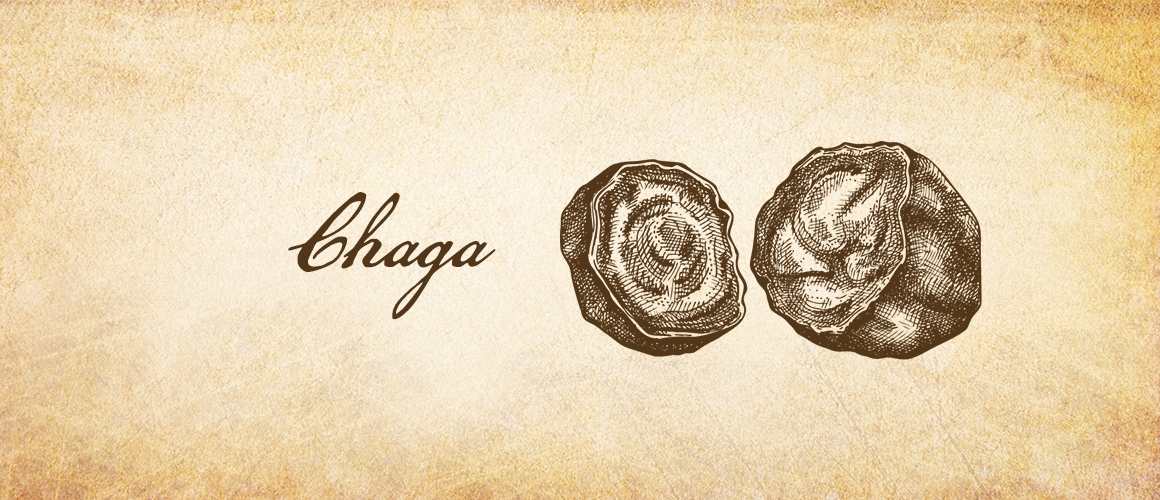
Chaga Mushroom and Traditional Medicine
Perhaps it’s because the leaves, bark, and sap of the birch tree[1] have been relied upon for most of human history, but something convinced ancient humans to give chaga a try. It certainly wasn’t the looks of the mushroom.
Chaga is a clumpy, charcoal-looking fungus that is orange on the inside. It’s also known as black mass, birch canker, and sterile conk trunk rot — none of them particularly appetizing names.
Looks aside, people in cold northern climates learned long ago that chaga mushrooms possess great medicinal potential. Ground into powder and brewed as tea, extracted into tinctures, and more, chaga has been used for centuries to treat stomach issues, tumors, pain, inflammation, and to boost the immune system.[2]
A staple of traditional Russian medicine, chaga mushrooms have been revered for centuries. In the early 12th century, Russian Grand Prince Vladimir Monomakh II reportedly cured his lip cancer with chaga mushrooms. In fact, the name “chaga” comes from gaga, the Slavic word for “lip.”
In 1966, the great Russian novelist Aleksandr Solzhenitsyn immortalized chaga in fiction. In his great novel Cancer Ward, Solzhenitsyn devotes a chapter called “The Cancer of the Birch Tree” to a cancer patient’s story about how he loved to “go away into the woods for months on end, to break off this chaga, crumble it, boil it up on a campfire, drink it and get well like an animal.”
We’ll stop here to say that, while chaga mushrooms have been used to great effect for hundreds if not thousands of years, the hard scientific data on the ability of chaga to treat serious illnesses is still under scrutiny. We’re not claiming that chaga treats cancer[3] or any chronic illness. Instead, we’re looking at what we do know both scientifically and anecdotally about this fascinating mushroom.
Chaga Mushroom Benefits
Okay, let’s talk about potential chaga mushroom benefits, and see why this mushroom has been embraced for so many centuries and is a popular ingredient in many health supplements — including our line of Mushroom + CBD products.
Note: These benefits have largely been studied only in animals or in very small human studies. It is important to discuss any supplement use with your doctor and do not stop taking your medication without consulting a health professional.

Chaga as Immune Booster
Among the potential health benefits of chaga mushroom are its immune properties. By promoting the production of proteins called cytokines,[4] chaga helps the body fight off viruses and more. Chaga stimulates white blood cells, which then attack intruders, inflammation, and more. Chaga may prevent formation of harmful inflammatory cytokines, as well.

Chaga as Anti-Inflammatory
While we’re on the subject of inflammation, chaga also serves as a natural anti-inflammatory. From ibuprofen to white willow bark to chaga mushrooms, anti-inflammatories work by blocking the enzymes that cause pain and inflammation, while also slowing damage caused by chronic inflammation conditions, like arthritis.

Chaga May Lower Blood Sugar and Cholesterol
Animal studies have shown that chaga has incredible potential to lower blood sugar levels and even possibly manage diabetes. In fact, one study showed[5] that chaga helped lower blood sugar levels 31% in diabetic mice. So far, the science is inconclusive as to how these chaga benefits apply to humans.
Similarly, it’s been shown that the antioxidant powers of chaga mushrooms may contribute to lowering your bad cholesterol (LDL) and increasing your good cholesterol (HDL).

Chaga as Adaptogen
When it comes to combining chaga with CBD, it’s the adaptogenic power of the mushroom that we look to. Adaptogens[6] are natural compounds that can help us manage and adapt to stress, including biological, chemical, and physical stress.
Adaptogens were first named during the Cold War by the Russian scientist Nikolai Lazarev, who was studying ways to increase vitality in athletes and soldiers. Since then, adaptogens have been extensively studied for their effects on the central nervous system and brain cells. They’re widely looked to for their potential to help with sleep, mood, anxiety, and stress.

Chaga as Nootropic
Another powerful attribute of chaga and many other mushrooms and fungi is the potential to boost and hone mental performance as a nootropic. Along with caffeine, L-theanine, ginkgo biloba and more, chaga mushrooms are well-regarded for their nootropic potential to improve cognitive function.[7]
There are a number of ways this seems to work, including stimulating growth and repair of nervous system cells, fighting brain cell inflammation, and maximizing the brain’s use of oxygen.
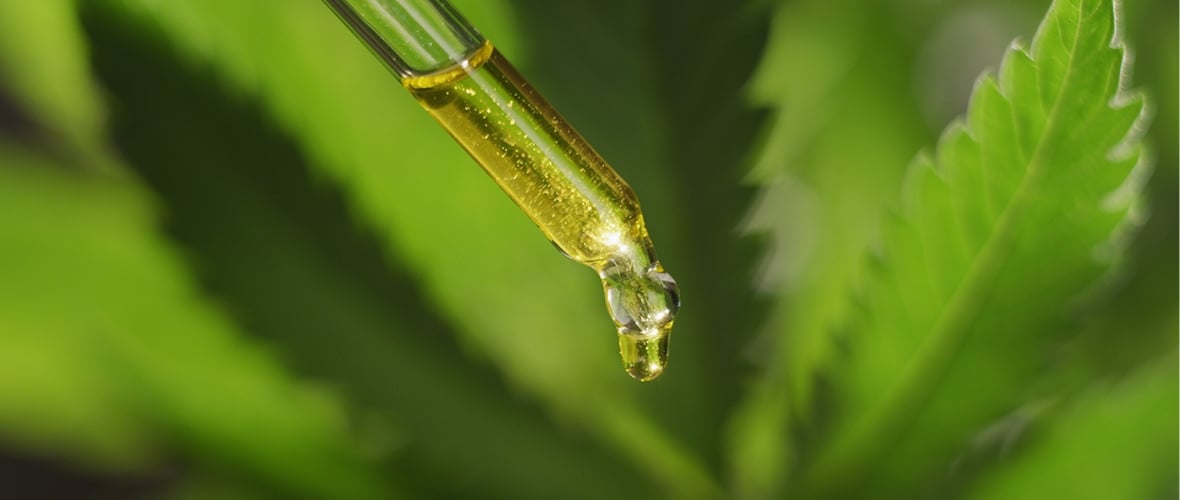
The Potential Health Benefits of Chaga and CBD
Okay, this is a blog on a CBD site, so there must be a CBD tie-in, right? Right! Now that we’ve discussed how chaga works, let’s do the same with CBD.
CBD is short for cannabidiol, one of hundreds of compounds found in the cannabis plant known as cannabinoids. CBD and other cannabinoids, like CBG, CBC, and CBN interact with receptors in a system in our bodies known as the endocannabinoid system.
The endocannabinoid system is integrated with our central and peripheral nervous systems, as well as tissues and systems in our body that regulate mood, sleep, immune response, and more. When a cannabinoid interacts with a receptor in the endocannabinoid system, it imparts therapeutic effects.
The wellness benefits of chaga, especially its adaptogenic and nootropic properties, make this mushroom a perfect fit with the soothing, therapeutic effects of CBD. Here at CBDfx, we’ve added chaga mushrooms to the focus-boosting combo of CBD and CBG for a powerful and effective energy blend.
Our Focus Mushroom + CBD Drops: CBG Energy Blend make the most of this CBD and chaga formula through a few very important factors:
- Broad spectrum CBD is CBD oil that has filtered out the legally allowed trace amounts of THC, but retained most of the other valuable cannabinoids present in cannabis hemp, including CBD, CBG, terpenes, and flavonoids. When these are all present, the conditions are right for the Entourage Effect, which is a synergistic effect where each element present in the product modifies the effects of other elements, while also contributing to a more powerful overall experience.
- CBG, also known as “the mother of all cannabinoids,” has been found to create what people describe as an energizing and focusing effect when combined with CBD and other supplements.
- Chaga adds its adaptogenic ability to lower stress on body and mind while delivering that energy boost we discussed above. These mushrooms also contribute nootropic power to boost cognitive function.
- Other adaptogenic mushrooms, namely lion’s mane mushrooms and cordyceps mushrooms, contribute their own stress-mitigating powers as well as protein, nutrients, and immune support.
When all these elements come together, the mushrooms and cannabinoids contribute to an incredibly balancing and energizing experience.
Psilocybin? Chaga vs “Magic” Mushrooms
Chaga is not a psychedelic mushroom. These mushrooms do not contain psilocybin and thus don’t possess the hallucinatory properties of “magic” mushrooms, a.k.a. “‘shrooms.” Similarly, CBD products are not psychoactive and do not cause a euphoric experience.
In short, all the ingredients we use, from CBD to chaga mushroom extract, are chosen for their wellness benefits and not to get you high.
Chaga, CBD and Your Health
Don’t worry, we’re not going to make this article as long as a Russian literary classic (Cancer Ward is nearly 600 pages). We’ll wrap up our mushroom discussion now with these final words.
Chaga on its own is a powerful supplement, tried and proven over centuries of holistic medicine practices. From anti-inflammatory properties to treating chronic illness, this simple mushroom is a wonder.
When combined with CBD, the adaptogenic and nootropic properties of chaga mushrooms are added to the Entourage Effect, giving our Mushroom + CBD products the potential to provide even greater therapeutic relief from stress and anxiety, to help boost our energy, and to enhance our overall wellness.
Wondering where to start with chaga? Try our Focus Mushroom + CBD Drops: CBG Energy Blend!
- Rx List. https://www.rxlist.com/birch/supplements.htm. 11 June 2021.
- Mary Jane Brown, Healthline. “What Are Chaga Mushrooms and Are They Healthy?” https://www.healthline.com/nutrition/chaga-mushroom#what-it-is. 25 October 2018.
- Sung Hak Lee, Hee Sun Hwang, Jong Won Yun. Phytotherapy Research. “Antitumor activity of water extract of a mushroom, Inonotus obliquus, against HT-29 human colon cancer cells.” December 2009.
- Suk-kyung Ko 1, Mirim Jin, Myoung-yun Pyo. Journal of ethnopharmacology. “Inonotus obliquus extracts suppress antigen-specific IgE production through the modulation of Th1/Th2 cytokines in ovalbumin-sensitized mice.” https://pubmed.ncbi.nlm.nih.gov/21820502/. 24 July 2011.
- Jun-En Sun. Journal of ethnopharmacology. “Antihyperglycemic and antilipidperoxidative effects of dry matter of culture broth of Inonotus obliquus in submerged culture on normal and alloxan-diabetes mice.” https://pubmed.ncbi.nlm.nih.gov/18434051/. 19 June 2008.
- Evan Starkman and Brunilda Nazario. WebMD, “Adaptogens: What To Know.” https://www.webmd.com/balance/adaptogens-what-to-know. 28 June, 2021.
- Erica Julson, Healthline. “The 14 Best Nootropics and Smart Drugs Reviewed.” https://www.healthline.com/nutrition/nootropics. 25 June 2018.

